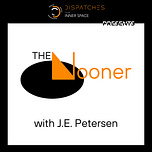This is The Nooner, a short daily (Monday - Saturday) newsletter slash podcast that has its very own section within Dispatches from Inner Space.
Every Sunday, I publish the Dispatches Weekly Digest (DWD), which lets you binge all the Nooners from the previous week. It also includes a meaningful song recommendation, and a short segment I call TMI, where I go off script to bring you backstage, so to speak.
Two more things about the DWD:
It goes on on the main Dispatches channel, so if you’re looking to spare your inbox from the daily emails without missing out on anything, you can specifically unsubscribe from The Nooner section, and still get the Digest on Sunday.
It’s only available to paid subscribers.
The Dispatches Weekly Digest is a labor of love, and I’m really proud of it, and if you want to hear it, I want you to hear it. So, if you can afford it…
And if you can’t, but you still think of yourself as one of my true fans, let me know and we’ll work something out.
Toward better algorithms
Most of us don’t think about this very often, but our ability to perceive reality is so dramatically, comically limited that we miss at least 99.99% of what’s going on *right now* in our immediate vicinity.
When you start to scale that outward, and backward, you might start to get a feeling of epistemological vertigo. Can anything be known?!
It depends on what we mean by “knowing.” If we define knowledge as being somehow thorough or complete, then no. It’s impossible. Pick up an apple. It’s made of fifty million cells. Take a bite. Swallow. Do you even know what happens next?
I mean, do you, personally, even know how swallowing works?
Everything we “know” is a distillation of virtually infinite information into something that is somehow useful to us.
Which is why we tell stories.
Stories are, by far, without question, the best compression algorithm we have to understand ourselves and the universe we live in.
I was struck by this idea in a conversation with an exceptionally smart guy who had written an alternative take on a famous historical account. He told me he was pretty sure no one else had broken it down like he had, despite how often and how thoroughly this particular account has been told, retold, analyzed, revised, and told again.
I’m sure he’s right. After all, he would only need to run a sufficiently unique compression algorithm to come up with a radically different story. One that might sound, to those familiar with the more commonly told versions, totally false.
Which begs an important question: What makes one story more true than another?
The more exhaustively you try to decompress any narrative, the more impossible it becomes to answer that question.
But it gets worse, because as human beings, we’re not even capable of processing information without compressing it into a narrative. We can’t help but run our algorithms on everything.
I sense a meta-principle here that I’d like to see if I can get to.
If we properly understand ourselves as a race of unreliable narrators, constantly compressing an infinite reality into our finite narratives, then we ought to have a bit more humility in the way we tell our stories, and listen to the stories other people tell.
The story is that we cannot accept any story as absolute truth. All we can do is ask, over and over, whether the stories we hear, and the stories we tell, are useful.
And as we strive and struggle to answer that question, we can continually revise our own compression algorithms, so that the stories we live by make the lives we live better.











